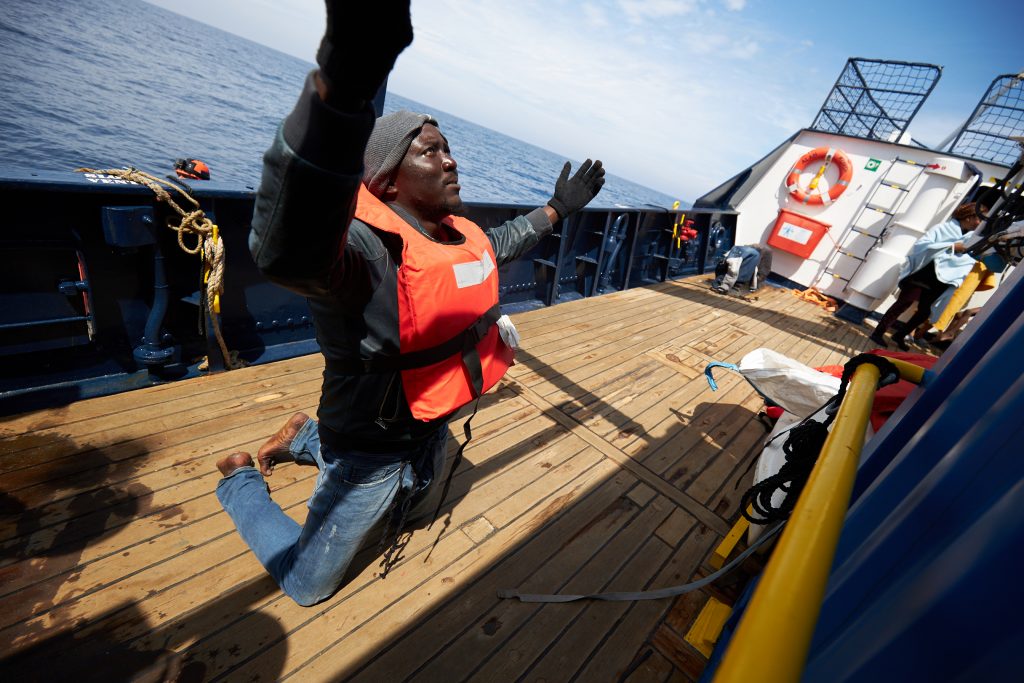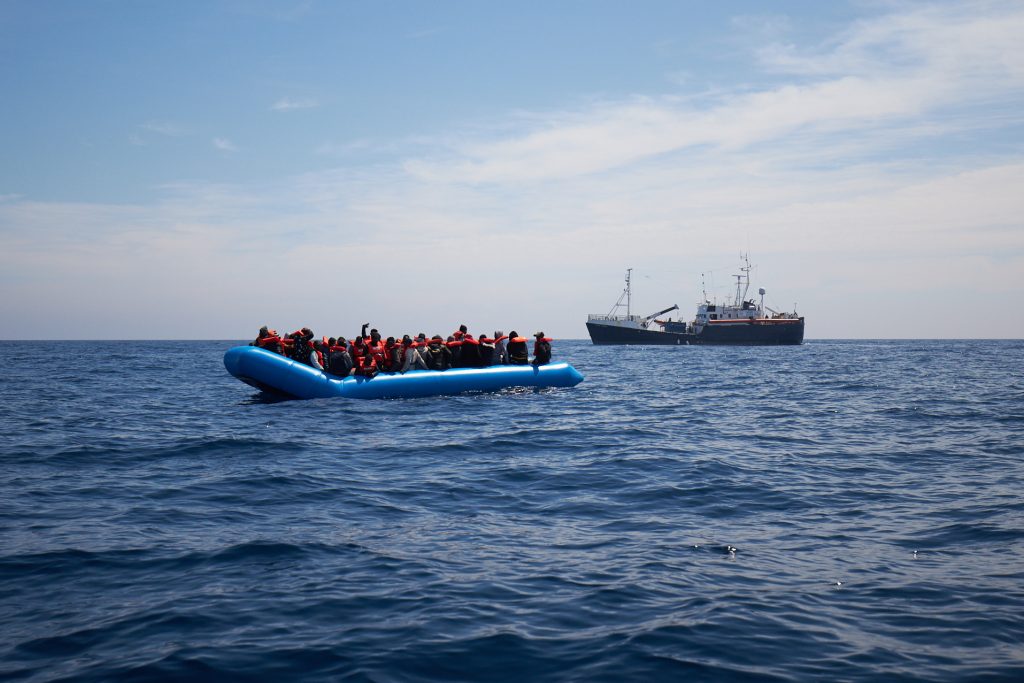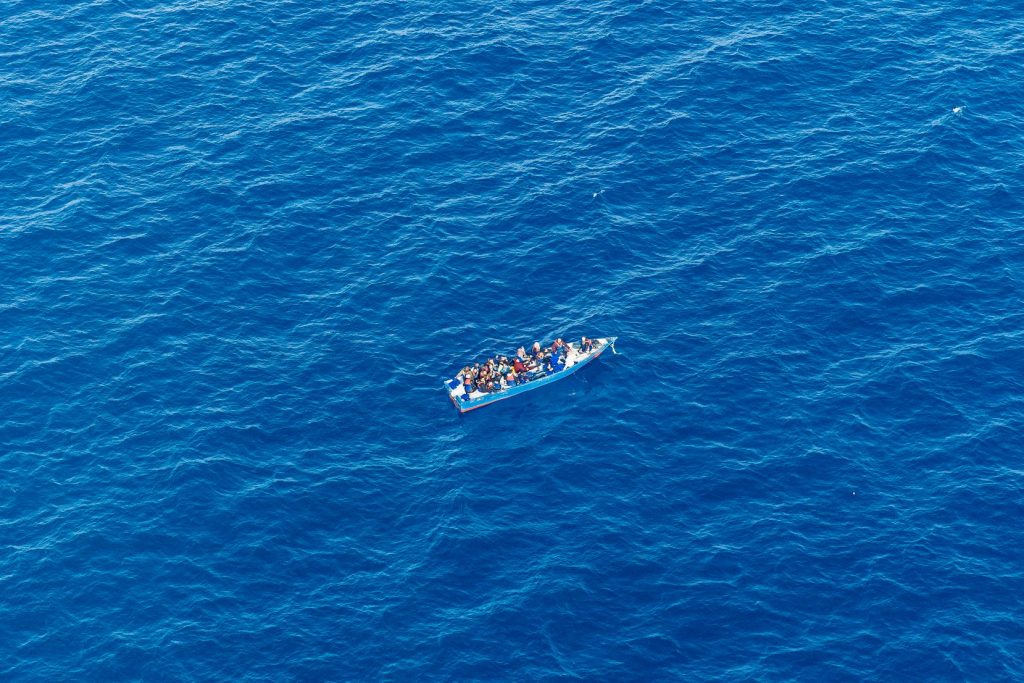This article originally appeared in “From the Sea to the City – 5 Years Alarm Phone”
Man rescued by Sea Eye’s Alan Kurdi. Photo: Fabian Heinz / sea-eye.org
When you receive distress calls every day, or at least several times a week over a five-year period, it is difficult or even is impossible to remember what occurred in particular cases, especially when you are such a large network. The thousands of cases we worked on were not experienced by a single individual but by a range of members in different shift teams. Some distress situations have left deep impressions on us, while others faded away over time. We experienced how migrant travellers sent us voice messages or videos when celebrating their safe arrival in Europe. We experienced how people were in panic while still in distress at sea, with no rescue in sight. And we experienced how our communication to boats broke off and we had to learn hours later that the people had not made it but lost their lives. We cannot pay tribute to this wealth of experiences and impressions. However, we want to re-narrate some recent cases that were memorable for many of us, one from each of the three Mediterranean regions.
Central Mediterranean
“I am very very tired… We are alone in this sea”
On the 29th of May 2019, in the evening, we were called by a relative of someone on a boat in the Central Mediterranean. The boat carried about 100 people. When we spoke to the migrant travellers at 22.00h they told us that they were on a rubber boat and that their engine had stopped. They had left Libya the day before. They were scared about the water coming into their boat. When we obtained their GPS position, we alerted the Italian Maritime Rescue Coordination Centre (MRCC) in Rome. The description of the boat, a black and white rubber boat, matched the description of a boat that the civil reconnaissance aircraft Moonbird had spotted earlier on the day. This meant that authorities had been informed about this distress case since the morning already.
At 23.40h, the people on the boat called us again, asking for rapid rescue as they thought they could not survive until the next morning: “One of the ‘balloons’ burst, water is entering the boat, we won’t survive much longer. … If we have to wait the whole night, no one of us will be alive. We don’t know how much battery is left.”
At 00.11h on May 30, we informed also RCC Malta about the situation and two minutes later we spoke to the people again. “It is too much cold. The kids are suffering from the cold, we are afraid for them. They are wet and freezing. There are fifteen kids, the youngest is 9 months, then 3 years, 4 years. We tried to move the kids in the corner of the boat, where is less water. There are 20 women or so on here. The women are strong but the one who is pregnant is very sick.” We told them that we informed Maltese authorities and that they needed to stay strong. We agreed to speak again in 30min.
At 00.36am, we informed MRCC Rome and RCC Malta about these developments. We also launched a public pressure campaign, alerting the public to this case of non-assistance. At 00.47h, the people on board said: “Some people are panicking. Some people are out of their mind because of fear.” At 00.56h, we spoke to MRCC Malta and asked about what procedures they had initiated. They were un-cooperative and merely said that they don’t have any information to share.
At 00.59h, also MRCC Rome refused to give us any information, merely stating that the boat was not in Italian waters. At 01:20h we talked with the people again – again we could not promise when coastguards were coming.
The person on board said: “It is so fucking inhumane what they are doing with us. We are here in the sea for more than a day now. They came with airplanes helicopters and everything. They know where we are and they just wait for the Libyans to come tomorrow to pick our corpses. Those who will still be alive will maybe then also go into the water because they want rather to die than to go back to Libya. Why can’t they let any fisher boat save us and then at least to avoid people to die. They can bring us to whatever shitty prison. But this situation here is so inhumane, you cannot imagine how we suffer.” We told him that we would stay with them until the end, whatever happens. We promised that we would call the coastguards and inform the public to raise pressure. He thanked us for being with them.
02.02h we spoke with the boat again: “The situation is really fucked up. I am sure nobody will rescue us before the morning. We will try to survive but we don’t know if we will.” We tell him he should call in case if anything changes but that we should speak less frequently, to save their battery. At 03.14h, he said: “I am very very tired… We are alone in this sea.” At 04.50h we spoke to the boat again: “The sun is here but we are still alone, we can’t see any boat.” He sounded extremely exhausted; it is calm in the background as if they don’t have energy for panic anymore. At 06.04h, we received another GPS location and forwarded it to RCC Malta. They stated that they were not operative in this case and say that the Libyan authorities were responsible.
At 06.37h the people called again. “There is a helicopter flying over us, but nothing on the water. Do you see a boat coming to us?” We say we cannot see any movements at the moment. At 07.42h, we updated their phone with credit. At 07.50h, the people said: “We are so tired.” At 08.00h, the people called and said: “A 5-year-old girl died.” We could hear people scream in the background. “One balloon is losing air. We hope the boat can reach us.”
At 08.19h, the people called again. “We see a ship. It is far away but big. Coming from where the sun is.” One could feel that people are getting excited. At 08.24h, we spoke to MRCC Rome – again they refused to state whether they were coordinating a rescue operation. At 08.30h, the people called again: “There is P490 written ton the boat.” It is an Italian Navy vessel. We instructed the people on how to prepare for rescue, one by one, and children and women first. At 09.05h, we spoke with the people again. And despite the bad connection, we heard that a rescue had been launched. The person on the phone said “goodbye”.
At 09.40h, the Italian press agency ANSA confirmed that the Italian Navy vessel P490 had operated a rescue. MRCC Rome nonetheless refused to confirm the rescue to us, just stating that the media was reporting on the case. The people were later disembarked in Genoa, Italy where they stated that some people had died during their journey.
Photo: Fabian Heinz / sea-eye.org
Western Mediterranean
“I’m one of three men who survived the shipwreck”
On the 1st of May 2019, at 5:27am CEST, we were alerted to 12 people who were missing after having left Morocco earlier that night. Authorities in Spain and Morocco were alerted and they launched a search and rescue operation for the boat. However, the boat remained missing. It was found only in the afternoon of May 2. At that time, eight people had already fallen overboard and drowned. During the rescue operation, another person, a woman who is assumed to have been pregnant, died.
On May 2, at 11.30pm, we were able to speak to one of the three survivors. After they were brought to a hospital, they feared that the police would come, and so they left. They went into hiding. Here is his testimony:
I’m one of three men who survived the shipwreck on 1st of May. We started as a group of 12 people, ten men and two women, at 01:00 am local time on the 1st of May from Tangier. The nine dead people came from Senegal. They came from one village and were very close to each other. They did everything together, slept together, shared meals, for me they appeared like brothers.
We contacted you [Alarm Phone] in the early morning of 1st of May. When I tried to send the GPS data from my smartphone a big wave made the boat capsize. We fell in water and the cell phone get wet. So I couldn’t use it any more. We’ve managed to turn the boat around and to climb into the boat again. We lost three people and also our paddles. The boat capsized again. We lost two more people. Again, we were able to turn the boat around and to climb into it.
We knew, we are in international waters. We could see the Moroccan coast and were driving further and further into the sea. The boat capsized a third time. We lost another person. Again we were able to turn the boat around and to climb into it.
In the morning we saw big container ships, which did not notice us, despite my red clothes, waving and shouting. Again, the boat capsized. We had no strength anymore to turn the boat around and we were sitting on the turned around backside of our zodiac. Two other people died. We were fighting for our lives.
On the next day, the 2nd of May around noon we were found by a very big, white ship with Spanish letters written on it, maybe a fishing boat. We were only four people left, three men and one woman. The crew of the big white boat told us to wait for rescue and they alerted the Marine Royal [Moroccan Navy]. We had no strength any more. The Marine Royale arrived at around 1.00–3.00pm and they started the rescue by throwing a rope to us. I was the first to be rescued. They picked up the second of us survivors. The waves were very high and the zodiac turned around again. The man and the women who were still on the boat fell into the water. The man still had the rope in his hand and could be saved. The woman was carried away by the waves. One man from the crew of Marine Royale jumped into the water to help her, but the woman was gone. After that they brought us to hospital. We couldn’t move anymore. We were so tired. I don’t know in which city the hospital was.
On the next day, the 2nd of May around noon we were found by a very big, white ship with Spanish letters written on it, maybe a fishing boat. We were only four people left, three men and one woman. The crew of the big white boat told us to wait for rescue and they alerted the Marine Royal [Moroccan Navy]. We had no strength anymore.
The Marine Royale arrived at around 1.00–3.00pm and they started the rescue by throwing a rope to us. I was the first to be rescued. They picked up the second of us survivors. The waves were very high, and the zodiac turned around again. The man and the women who were still on the boat fell into the water. The man still had the rope in his hand and could be saved. The woman was carried away by the waves. One man from the crew of Marine Royale jumped into the water to help her, but the woman was gone. After that they brought us to hospital. We couldn’t move anymore. We were so tired. I don’t know in which city the hospital was.
Aegean Sea
“They shouted ‘We will save you. Follow us’.”
On the 11th of April 2019, we were contacted by a boat coming from Turkey and moving toward Agathonisi Island with 35 people on board who had escaped from Syria, Iraq, Palestine and Somalia. The group included ten children, among whom were also infants, and five women. There were individuals with severe war injuries on board. The boat was in serious distress and clearly located in Greek waters. During this case we witnessed a “push-back” – the act of returning those fleeing to the state where they had departed from. Our shift team swiftly alerted the Greek coastguards to the situation. We remained in contact with the boat and received several more GPS locations from the travellers.
Although we forwarded all the positions to the Greek authorities, they informed us that the boat had been ‘found’ in Turkish waters and returned to Turkey. The testimonies of the survivors and the GPS positions forwarded to us refute this account. Instead they highlight how the Greek coastguards tricked the people to follow them back into Turkish waters by telling them that they were being directed to safety in Greece. When the travellers realised what was going on, they sought to turn around and move again toward Greece.
At that point they had reached Turkish waters and the Greek coastguards prevented them from escaping whilst leaving it to the approaching Turkish coastguards to carry out a ‘rescue’ operation. In their testimony the people on board reported how they were refouled:
“We started around 3:30 am CEST from the Turkish coast. After three hours of driving, first towards Nera / Agathonisi and later slightly towards Farmakonisi, we were stopped at 5:50 CEST by the Greek Coastguard. It was very cold and our kids were screaming from fear. Water was entering the dinghy from the waves. It was a grey and white coast guard boat. There were four officers dressed in blue uniforms. They were making circles around us. They shouted: ‘We will save you. Follow us.’ They pointed us to go in another direction.
We get confused and followed them a little bit. Then we stopped. We understood we were driving back. They ordered us to turn off our motor. We were asking for help. We showed them our kids in the air and begged them to let us stay in Greece. But they said, we were doing something illegal. After 30 minutes a Turkish Coastguard boat arrived, and the Greeks left. We were brought to a Turkish police station. It was a one and a half hours drive back. They said if we’d ever try again to cross illegally to Greece, they’d deport us back to our countries.”
Photo: Sea-Watch e.V. / HPI


